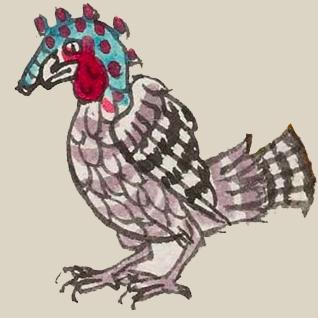Huexolotlan (Mdz16r)
This simplex glyph for the place name Huexolotlan also doubles as the glyph for the turkey (huexolotl). The whole bird is shown, standing, facing to the viewer's left, with lavender and white feathers on most of its body, except the head. The head is largely turquoise, with red bumps along the crest and sides of the head. Its neck is red. Above the beak is a fleshy, turquoise and red-striped protrusion. The beak is closed. The locative suffix (-tlan) is not shown visually.
Stephanie Wood
The huexolotl) was a tribute item. The bird also had associations with Tetzcatlipoca and other divinities. The turkey hen could be called totolin or cihuatotolin. Alexander von Humboldt wrote: "New Spain has supplied Europe with the largest and most useful of domestic gallinaceous birds, the turkey (totolin or huexolotl) which was formerly found wild on the back of the Cordilleras, from the Isthmus of Panama to New England" (Political Essay on the Kingdom of New Spain, vol. 3, p. 55, of 1811).
Compare the red and turquoise details of the head of this turkey cock with this open-source photograph. When one thinks about how these colors were valued in Aztec culture, one can understand the attraction to this bird, not to mention for its food value.
Stephanie Wood
/ huexolotlan_puo
Huexolotlan, pueblo
Stephanie Wood
c. 1541, or by 1553 at the latest
Stephanie Wood
huehxolotl, vesulotl, uexolotl, turkeys, turkey cock, turkey cocks, gallipavo, aves de corral, birds, guajolotes, fowl, feathers, plumas, nombres de lugares, ave, aves, pájaro, pájaros, pluma, plumas, animals, animales

huexolo(tl), a male turkey, https://nahuatl.wired-humanities.org/content/huexolotl
-tlan (locative suffix), place, https://nahuatl.wired-humanities.org/content/tlan
"Turkey Cock Place" [Frances Karttunen, unpublished manuscript, used here with her permission.]
"Where There Are Many Turkeys" (Berdan and Anawalt, 1992, vol. 1, p. 188)
"El Lugar del Guajolote"
Stephanie Wood
Codex Mendoza, folio 16 recto, https://digital.bodleian.ox.ac.uk/objects/2fea788e-2aa2-4f08-b6d9-648c00..., image 42 of 188.
The Bodleian Libraries, University of Oxford, hold the original manuscript, the MS. Arch. Selden. A. 1. This image is published here under the UK Creative Commons, “Attribution-NonCommercial-ShareAlike 3.0 License” (CC-BY-NC-SA 3.0).
